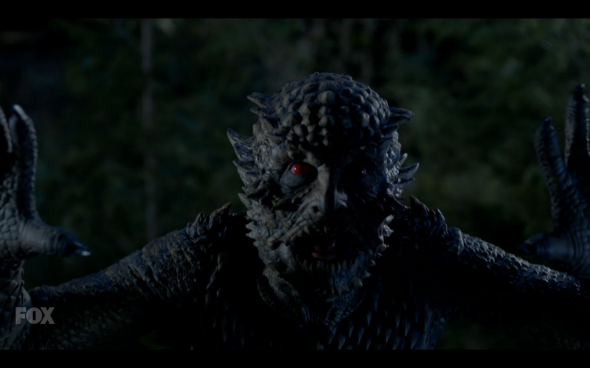“We’ve been given another case,” Dana Scully tells a morose Fox Mulder at the top of last night’s X-Files episode. “It has a monster in it.” At first there’s something promising about that passive construction, especially for the viewer trained to trust no one: “We’ve been given,” Scully begins. By whom? one wants to ask. Though we never learn the answer to that question, the episode that follows is strikingly light on conspiratorial thinking, and heavy on the monster action. More surprisingly still—especially after the relatively dire first two episodes of the new season—the episode is all the better for it.
If you’d asked me when I was a teenager, I’d have told you that the X-Files’ conspiracy-focused episodes made for its finest hours. That may have been because they always promised something more than themselves. Though the story’s broader arc rarely made sense—even in the relatively coherent early seasons—the very fact that something larger loomed just out of sight was exciting. These linked stories seemed to infuse the more common one-off monster-of-the-week tales with a special charge. At the time they felt important, meaningful even, rewarding dedicated viewers for our diligence.
But with this week’s episode—the campily titled and goofily plotted “Mulder and Scully Meet the Were-Monster”—I’ve finally faced the error of my ways, recognizing at last that the series’ disconnected installments were its true treasures. Though its story stands alone, “Were-Monster” finds the series’ returning cast and crew grappling with the legacy of their work. Sometimes that means we get to watch our characters struggling to keep up with the times, as when Mulder fumbles with a new app on his phone while trying to get a picture of a menacing lizard creature. (An ill-considered joke about a trans prostitute likewise derives from this otherwise cute attempt to show our characters lagging behind a world that has moved on.) And sometimes it has them wondering whether any true mysteries remain in a Google-connected world.
In a sense then, “Were-Monster” is very much about the X-Files. Where the two episodes that preceded it make clumsy returns to the series’ meta-plot, this one is straight up metafiction. As written and directed by Darin Morgan—also responsible for fan favorites such as the heartbreaking “Clyde Bruckman’s Final Repose,” which gets a clever nod here—it serves as an indirect denunciation of the series’ attempts to go broad, offering a charming reminder that the show was always best when it accepted its smallness.
“Were-Monster” (and here be were-spoilers, for those who haven’t seen the episode yet) turns on a simple twist, one no less apt if it borders on the predictable. The terrifying humanoid monitor lizard we meet in the early going was, we learn, simply minding his own business—a benign beast, despite his strangeness. When a homicidal human bites him, however, he’s beset with a curse that intermittently—the exact time table never gets explained—turns him into a human (Rhys Darby), subject to all the resulting urges: Wear clothes, get a job, and save for a mortgage, “whatever that is.”
When the X-Files was first airing, its serial conspiracy episodes seemed to be rare anomalies, the sort of thing that might burst out on a blue moon. In practice, they were bound in by their own formulas, much as Darby’s lizard feels trapped in the skin of a man. However subtly they did so, they introduced rules—often inexplicable ones, though they were no less turgid for it—into a narrative universe that needed nothing of the kind. Even as they strung us along, keeping us coming back from one week to the next, they never had much more to offer than an inevitable, and inevitably unhappy, retirement.
Though Morgan was always a clever (if mostly loving) critic of the X-Files’ silliness, in “Were-Monster” he arguably offers a sly denunciation of the entire television landscape that’s arisen in its wake. The X-Files helped make seriality safe for network television, proving that there was a market for slow-building, nerdy narratives like those of Lost, Heroes, or any number of other dubious hits. Much as the X-Files itself did, virtually all of those shows eventually collapsed under their own weight. In the process of making those failures possible, the X-Files largely supressed the very thing that made it special—its smaller stories with their much stranger stakes. Last night’s episode, however, provides a joyous reminder that there are still monsters in the woods, even if we can only see them by the light of the full moon.
